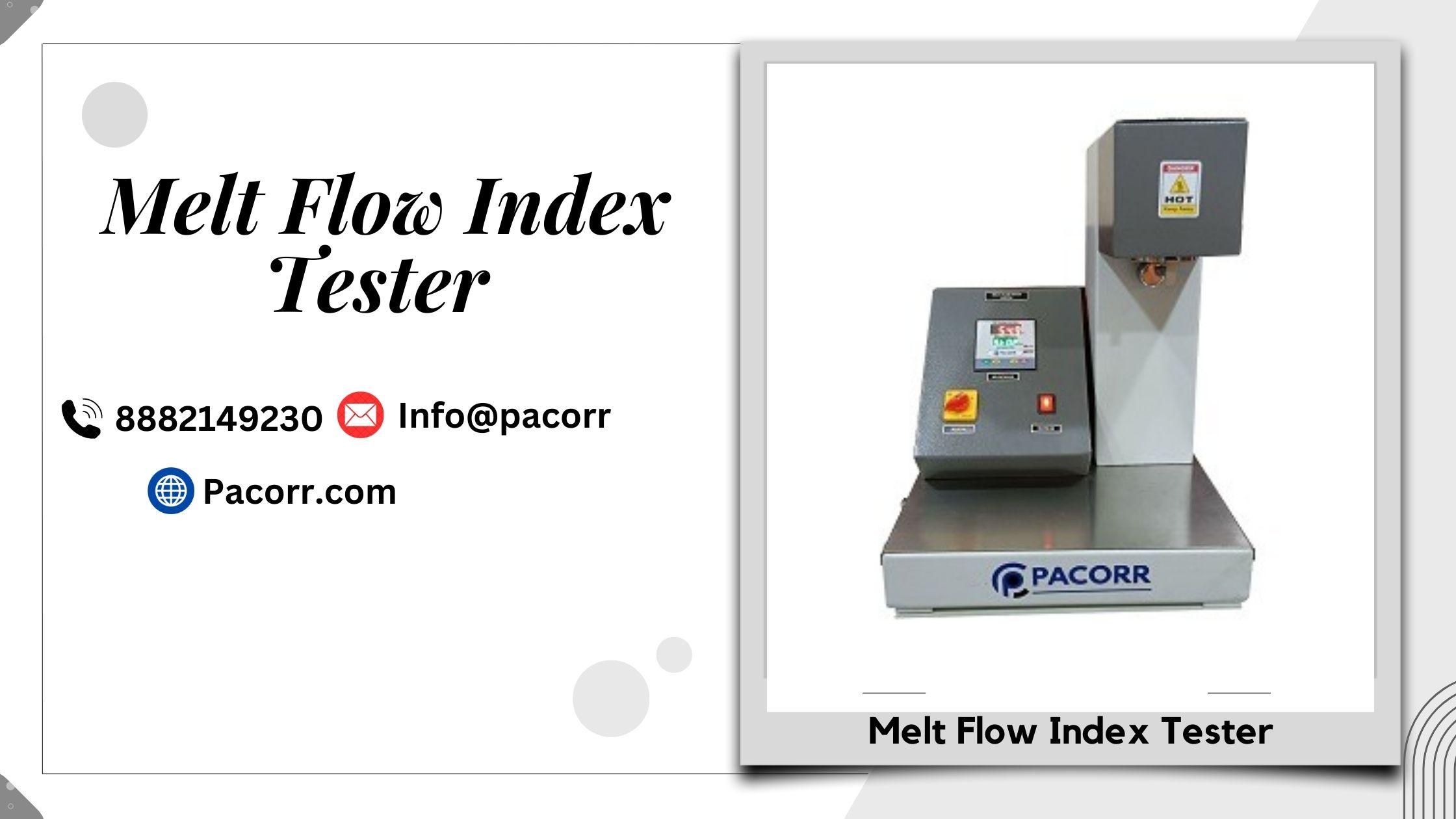The Melt Flow Index Tester (MFI) is an essential instrument in the polymer industry, used to assess the flow characteristics of molten plastic materials. As a crucial part of quality control and product development, the MFI provides important data about the processability of plastics, influencing decisions on manufacturing and processing. In this blog, we'll explore the importance of the Melt Flow Index Tester , its uses, benefits, and how it can help optimize production processes.
What is a Melt Flow Index Tester?
A Melt Flow Index Tester is a device designed to measure the flow rate of melted polymers. The test involves measuring the amount of material that flows through a standardized orifice under controlled conditions of temperature and pressure, which are set according to industry standards. The resulting data, expressed in grams per 10 minutes, is known as the Melt Flow Index (MFI) , and it reflects the material's viscosity when in a molten state.
Why is the Melt Flow Index Tester Important?
The Melt Flow Index Tester is important for several reasons:
- Material Characterization: It helps identify the molecular weight and the polymer's ability to flow, which affects its processing behavior during molding, extrusion, or other polymer manufacturing processes.
- Quality Control: Regular testing ensures that the polymer’s melt flow properties remain consistent, reducing the risk of defects in final products.
- Comparing Materials: Manufacturers can use MFI data to compare different polymer formulations and choose the most appropriate material for specific applications.
- Regulatory Compliance: For many industries, adherence to international standards is essential. Using an MFI tester ensures compliance with regulations that govern material quality.
How Does the Melt Flow Index Tester Work?
The Melt Flow Index Testing operates by melting the polymer sample in a cylindrical barrel, then forcing the molten polymer through a small die (or orifice) at a specific temperature and pressure. The flow rate of the polymer is measured, giving an indication of its viscosity.
Key Steps in the Testing Process:
- A sample of polymer is placed in the tester's barrel.
- The tester is heated to the desired temperature, which is typically between 190°C and 250°C, depending on the polymer being tested.
- A weight is applied to the material, forcing it through the orifice.
- The amount of polymer that flows through the orifice is measured in grams per 10 minutes, and this is recorded as the Melt Flow Index.
Benefits of Using the Melt Flow Index Tester
- Improved Process Efficiency: By monitoring the MFI of polymers, manufacturers can adjust processing parameters to achieve optimal flow characteristics. This leads to smoother processing and reduces waste.
- Material Performance Prediction: The MFI provides valuable insights into how a polymer will behave during production, helping manufacturers predict its behavior in real-world applications.
- Cost Reduction: By ensuring the right polymers are used and processed efficiently, MFI testing helps reduce costs associated with defective products, material wastage, and rework.
- Customizable Testing: The MFI tester allows manufacturers to test various types of polymers under different conditions, ensuring that each material is tested in the most appropriate manner for its intended use.
Applications of the Melt Flow Index Tester
The Melt Flow Index Tester Price has wide applications across multiple industries:
- Plastic Industry: It is crucial for manufacturers of polyethylene, polypropylene, and other plastic materials. It helps ensure consistent material quality and performance.
- Automotive : The automotive industry uses MFI testing to evaluate materials used in automotive components like bumpers, dashboards, and interior trims.
- Packaging : Manufacturers of plastic packaging use MFI testers to ensure their products meet the necessary standards for strength, flexibility, and durability.
- Medical Devices : In medical device manufacturing, the MFI is used to test polymers for the production of sterile packaging, surgical instruments, and implants.
- Consumer Goods : From toys to household appliances, MFI testing ensures that the materials used are suitable for the desired application.
Factors Affecting Melt Flow Index Testing
While the MFI test is a reliable way to evaluate polymer flow properties, several factors can influence the results:
- Temperature : A slight variation in temperature can significantly alter the polymer's flow rate, leading to variations in the MFI readings.
- Material Composition : Additives, fillers, and the molecular structure of the polymer affect its flow behavior.
- Test Conditions : Factors such as the size and type of orifice, the applied weight, and the duration of the test can impact the final MFI reading.
Choosing the Right Melt Flow Index Tester
When selecting a Melt Flow Index Tester, consider the following features:
- Temperature Control : Ensure the tester offers precise temperature control for accurate results.
- Load Capacity : Depending on the material being tested, ensure the tester can accommodate the necessary weight range.
- Ease of Use : A user-friendly interface with clear instructions will make it easier to operate the equipment and obtain consistent results.
- Compliance with Standards : Ensure that the tester complies with industry standards such as ASTM D1238 and ISO 1133 , which ensure the reliability and comparability of the results.
Conclusion
The Melt Flow Index Tester is an indispensable tool for evaluating the flow properties of polymers. By providing accurate and reliable data, it enables manufacturers to optimize their processes, improve product quality, and maintain consistency. Whether in the plastic, automotive, packaging, or medical industries, the MFI tester offers valuable insights that lead to better material selection and more efficient production processes.
For more information about the Melt Flow Index Tester and to explore other testing solutions, visit pacorr.com .



